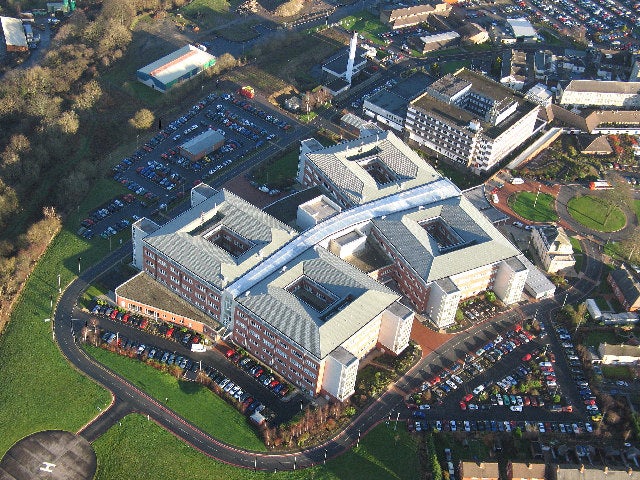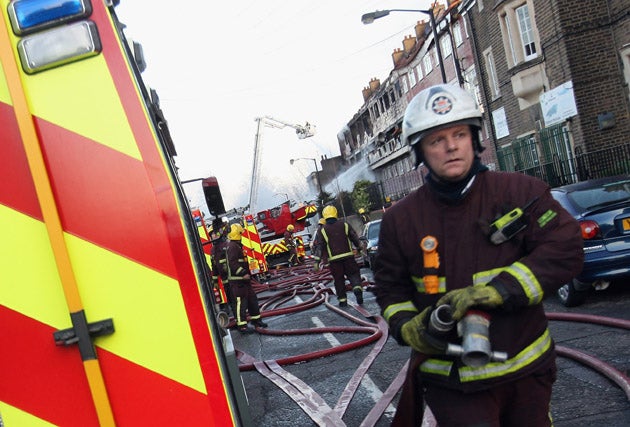Britain’s first PFI privately funded NHS hospital is a 'major' fire safety risk, say fire fighters
The NHS Trust that runs the hospital says the PFI deal has caused problems

Your support helps us to tell the story
From reproductive rights to climate change to Big Tech, The Independent is on the ground when the story is developing. Whether it's investigating the financials of Elon Musk's pro-Trump PAC or producing our latest documentary, 'The A Word', which shines a light on the American women fighting for reproductive rights, we know how important it is to parse out the facts from the messaging.
At such a critical moment in US history, we need reporters on the ground. Your donation allows us to keep sending journalists to speak to both sides of the story.
The Independent is trusted by Americans across the entire political spectrum. And unlike many other quality news outlets, we choose not to lock Americans out of our reporting and analysis with paywalls. We believe quality journalism should be available to everyone, paid for by those who can afford it.
Your support makes all the difference.Britain’s first NHS hospital financed and built by private capital is a “major” fire safety risk, fire fighters have said.
The Cumberland Infirmary in Carlisle was first opened in 2000 under the controversial “private finance initiative” which sees the NHS pay a private company rent-like payments to make use of facilities.
An independent report commissioned by the NHS trust that manages the hospital found that fire proofing materials installed by the private company did not meet the required protection standard to allow for save evacuation and prevent a fire from spreading across the building.
Local NHS bosses have given dozens of NHS staff members emergency fire safety training to step up safety while work to fix the problems caused by the original contractors goes on.

“It has to be asked why it has taken so long to identify the flaws in fire proofing materials used in the hospital’s construction. The work to rectify this issue is expected to take up to 18 months,” said Graeme Higgins, secretary of Cumbria’s Fire Brigades Union.
“Public safety, especially the safety of vulnerable patients in hospitals, is of paramount importance to fire fighters. We would urge all stakeholders involved with PFI buildings in Cumbria to review the fire safety materials and procedures currently in use. In Carlisle alone we have two PFI fire stations.”
Mr Higgins described the hospital as “one of Carlisle’s biggest fire risks” and warned that service cuts could impair fire fighters’ ability to respond to any incident.
Helen Ray, chief operating officer at North Cumbria University Hospitals NHS Trust, which is fixing the problems, was critical of the PFI deal.
“The safety and welfare of our staff, patients and members of the public using the Cumberland Infirmary is paramount and people can be absolutely reassured that we are taking all of the right steps to protect their wellbeing whilst they are using our services,” she said.
“This is not the first time we have uncovered such major flaws in the service provided to us through our PFI partner and the Trust Board remains very deeply concerned that the current arrangements are not providing the high standards of service we require for our patients in North Cumbria on a consistent basis.”
The hospital in question was opened under the New Labour government in 2000. The UK owes more than £222bn to banks and businesses as a result of Private Finance Initiatives, which were conceived by the Conservatives in the 1990s and embraced by New Labour.
Last year The Independent reported how firms given 25-year PFI school contracts had doubled their money by selling off shares in the schemes fewer than five years into the deals.
A briefing from the National Audit Office released earlier this year says that PFI has been more expensive in the long-run than conventional financing.
“In the short term using private finance will reduce reported public spending and government debt figures,” the briefing said, adding that in the longer term “additional public spending will be required to repay the debt and interest of the original investment”.
PFI yielded assets worth £56.5bn but the UK government will ultimately pay more than five times that amount under the terms of the agreements.
Join our commenting forum
Join thought-provoking conversations, follow other Independent readers and see their replies
Comments